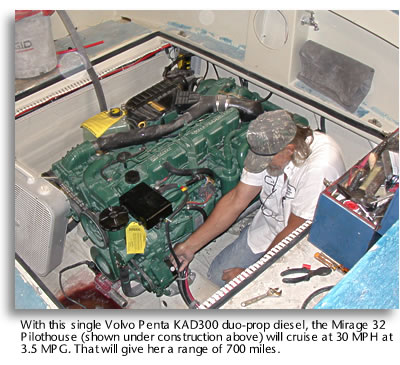|
Albert Bowers criticizes boatbuilders who push twins
“Most modern production powerboats designs…suffer principally and somewhat paradoxically from the provision of too much power,” writes naval architect Bert Bowers of Annapolis, MD, in the November 2002 issue of Professional BoatBuilder magazine.
Bowers was criticizing those in the boatbuilding industry, including many sportfish manufacturers, who aggressively market twin-screw boats to a market overly impressed with top speed. Bowers, however, isn’t against speed per se, but the inefficiencies that result when two engines are installed even though a boat will perform quite nicely with just one.
“Two engines provide very little if any added speed, owing to the substantial weight of a second power plant, plus the drag of a second propeller shaft, strut and rudder-and in the case of I/O or outboard propulsion, another gear case. In order to achieve this small increase in top speed, the weight of the propulsion system gets doubled, which means that the space devoted to engine, fuel, exhaust and batteries is also basically doubled, as are the initial cost and the operating and maintenance expense of the entire propulsion system…The fact is, top speed might be raised by only a few percent (or not at all) compared to a well-designed single-screw boat,” Bowers wrote.
Mirage Manufacturing encourages prospective sportfish buyers to read the article in its entirety as it appears in the Parting Shot column on Page 128 of the magazine, in which Bowers also writes:
“Inexperienced boat owners are impressed by the high performance that manufacturers claim for their boats, but those buyers fail to realize that such boats become ungainly when run at the more sensible speeds typically mandated by sea conditions, heavy traffic, speed restrictions or the comfort of one’s crew. Although the boat with extravagant power may have an impressive top end, it will not have the sprightly, nimble feeling we all love in a fast runabout.”
Ken Fickett, president of Mirage Manufacturing, praised Bowers’ remarks, noting that the naval architect’s concluding paragraph, an exhortation for more professional responsibility, has long been Mirage’s sales philosophy. “Unlike full-displacement trawler yachts, in which twin screws can be both more efficient and cheaper, a well designed planning hull such as our Center Console 32, really runs better with a single diesel I/O. That’s what we tell our customers. We think Mr. Bowers would approve.”
Here’s how Albert Bowers, who has designed and built many production and custom yachts for both power and sail, concluded his essay:
“Today’s recreational marine-industry must find ways to educate consumers about the qualities that create a good boat. Builders should not be selling poorly designed boats to buyers who do not understand the costly trade-offs that must be made in the design process to accommodate excessive, unnecessary-and, in my view-undesirable power.”
|





